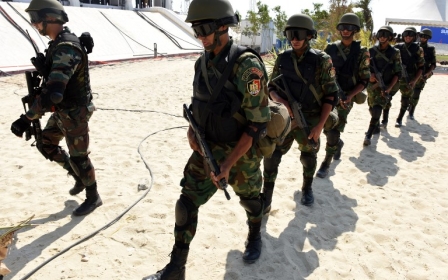Egypt’s counter-revolution has put the nation in peril

It is five years since the military coup took place in Egypt on 3 July 2013. But in spite of the fierce attacks waged by the current regime, the 25 January revolution that was overthrown in that coup continues to cast its shadow upon Egypt's political scene.
The uprising in early 2011 was a game-changing moment in modern Egyptian history, upending the scales of power and rendering the government temporarily powerless. But as time went on, the regime caught up.
The regime treats "25 January" as a movement, while it is in fact an idea that manifests itself in three ways: through life, freedom and social justice. The Egyptian regime has long sought to undermine this concept and turn it into a movement, thus making it easier to destroy.
Containing the Egyptian revolution
As the counter-revolution emerged in full throttle, the revolution was undermined and besieged. The tactics implemented after the 2011 uprising were the same ones utilised against the Muslim Brotherhood in the lead-up to the 2013 coup.
So how was the revolution undermined, or rather how was the counter-revolution conducted?
The uprising in early 2011 was a game-changing moment in modern Egyptian history, upending the scales of power and rendering the government temporarily powerless
The process of containing the Egyptian revolution, and the way it was directed from the outside - behind the scenes with interference from some Gulf states - began a few days before former president Hosni Mubarak abdicated power. It became clear that the next phase would play out very differently, in a way that benefited the state.
A battle was orchestrated over Egypt's referendum and the 2012 constitution. In addition, the notion of maintaining old institutions, such as the judicial authority and security services, without meaningful reforms or a purge, highlighted an attempt to clone the old regime and renew its ascendancy. This has been a recurring theme in many revolutions worldwide.
Defensive wall of media
In Egypt, this cloning occurred through intermediaries, such as the transitional government set up to manage the country's political scene in 2011-2012. This government was ineffectual, which became clear through the remedial solutions offered by the former interim prime ministers, Essam Sharif and Kamal Ganzouri.
In addition, the interior ministry, as it continues to do now, represented the security arm being used to assault the revolution. The army was used in various ways, such as the 2011 slaughter of Coptic Christians and the 2013 Rabaa Square massacre. The security entity has typically been put to work under the guise of media coverage that acts as a defensive wall against the reality of what's happening.
Such tactics were seen through the creation of a false protesting crowd to counter the Tahrir revolutionaries. This is a reproduction of what happened in 1954, after the crisis sparked by former President Gamal Abdel Nasser's removal of his predecessor, General Mohammed Naguib. After Nasser orchestrated a crippling transit strike, a large number of protesters came out and chanted: "Down with democracy … Down with freedom!", as mentioned in Abdelazim Ramadan's book on the social and political conflict in Egypt from the revolution of 23 July 1952 until the end of the March 1954 crisis.
Facilitating the 2013 coup
The state has also invested more time in creating neoliberal entities with close and intimate ties to the ruling class to occupy a bigger space in the political theatre. This became apparent through various funding activities to enforce the state's domination of newly formed partisan entities.
During its meetings with revolutionary youth in 2011 after Mubarak stepped down, the Supreme Council of the Armed Forces, known as SCAF, offered to provide financial assistance for establishing new political parties under its supervision. In March 2011, I had the opportunity to attend a SCAF meeting at the defence ministry offices in Cairo, where I was invited to speak about my political vision for the transition period. The meeting provided me with the opportunity to get more details about the army's plan at that time.
The National Salvation Front that supported the 30 June 2013 protests, which spurred the takedown of former president Mohamed Morsi, played this role perfectly. Once their goal had been achieved, they dissolved as a force completely. This goes to show that the protestors never had any political plan or vision, and were nothing more than a front to facilitate the coup d’etat that brought President Abdel Fattah al-Sisi into power.
The state has also undermined the revolution through its collaboration with political Islamist forces. These forces are not one united bloc; there are factions with close ties to the state security apparatus and the ruling class such as the Salafist al-Nour party.
Now, more than seven years since the 25 January uprising and five years since the coup, Sisi this year destroyed all of his political opponents and allies alike to become the only "candidate" for the presidential election - which he won with 97 percent of the vote.
As a consequence of such practices, the crisis between the state and different political factions has deepened.
- Taqadum al-Khatib is a PhD scholar at Princeton University and Berlin's Free University. He is also the former coordinator of the political communications dossier with the Egyptian National Association for Change. He tweets @taqadum
The views expressed in this article belong to the author and do not necessarily reflect the editorial policy of Middle East Eye.
Photo: Egyptian soldiers stand guard as people arrive at a polling station in Cairo on 27 March 2018 (AFP)
Stay informed with MEE's newsletters
Sign up to get the latest alerts, insights and analysis, starting with Turkey Unpacked
Middle East Eye delivers independent and unrivalled coverage and analysis of the Middle East, North Africa and beyond. To learn more about republishing this content and the associated fees, please fill out this form. More about MEE can be found here.






